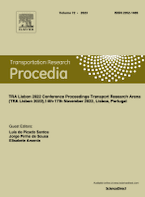Cross-culturally approaching cycling safety from a behavioural perspective: a study in 19 countries
- Autores: Sergio A. Useche, Francisco Alonso, Aleksey Boyko, Polina Buyvol, Isaac Castañeda, Boris Cendales, Arturo Cervantes, Tomas Echiburu, Mireia Faus, Zuleide Feitosa, Jozef Gnap, Mohd K. Ibrahim, Kira H. Janstrup, Ignacio Lijarcio, Irina Makarova, Cristina Marin, Rich McIlroy, Miroslava Mikusova, Mette Møller, Luis Montoro, Sylvain G. Ngueuteu-Fouaka, Steve O'Hern, Mauricio Orozco-Fontalvo, Ksenia Shubenkova, Jose Soto, Amanda Stephens, Yonggang Wang, Ellias Willberg, Phillip Wintersberger, Linus Zeuwts, Zahir H. Zulkipli, Felix Siebert (2023).
- Tipos de publicación: Article
- URL Publicación: Cross-culturally approaching cycling safety from a behavioural perspective: a study in 19 countries
- Título Publicación (nombre del libro o revista): Transportation Research Procedia. Num.72:4143-4150
-
Resumen:
While promoting urban cycling has shown to represent several benefits for public health, risky behaviours might endanger cycling safety outcomes and discourage people from shifting to active transportation. Therefore, examining the relationships among riding behaviour, safety, and country-based figures seems valuable for promoting a safer and sustainable development of urban cycling worldwide. For this study, 7,001 urban cyclists from 19 countries provided data on their mobility patterns, cycling behaviours and safety outcomes. The results show that positive behaviours are overall more prevalent than risky ones. However, behavioural patterns largely vary depending on riders’ demographics and country-based indexes. It supports the idea that cycling behaviour remains a key contributor to cycling outcomes, as well as the need to fill many gaps endangering riding safety across many countries.
DOI: 10.1016/j.trpro.2023.11.361ISSN: 2352-1465










